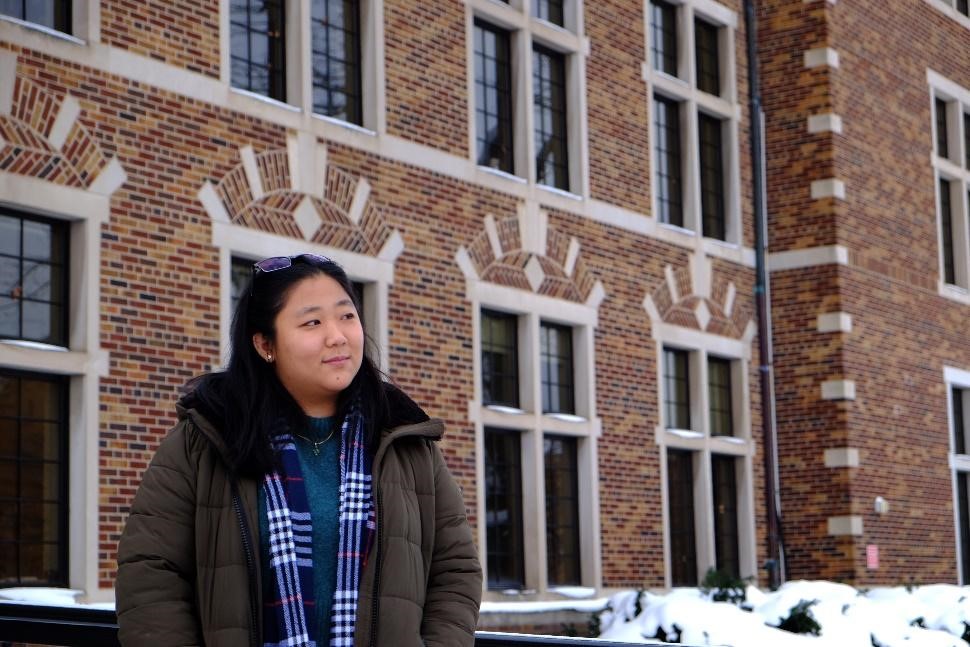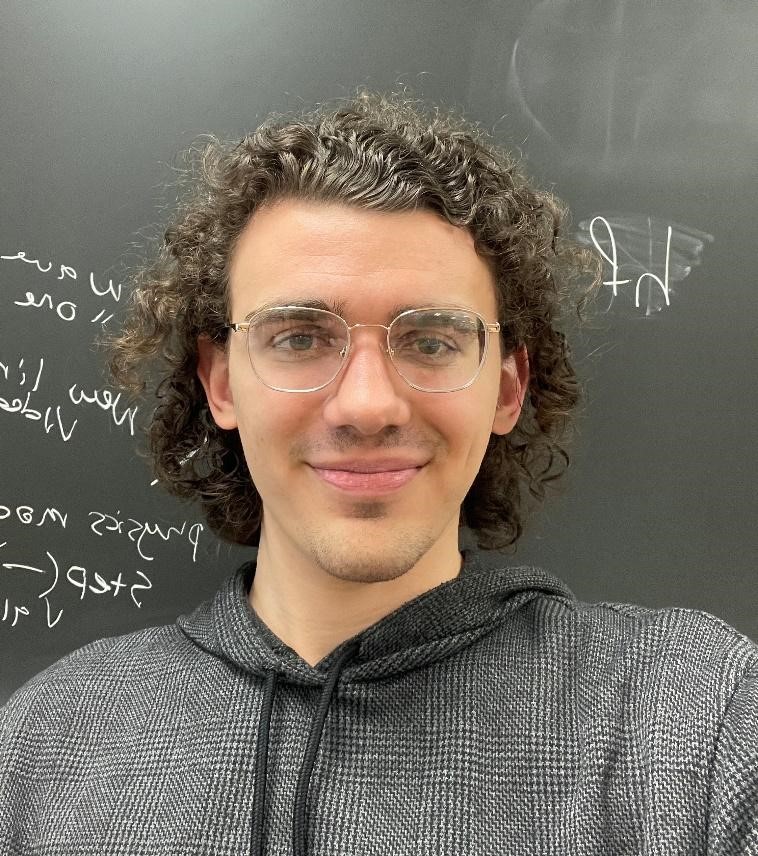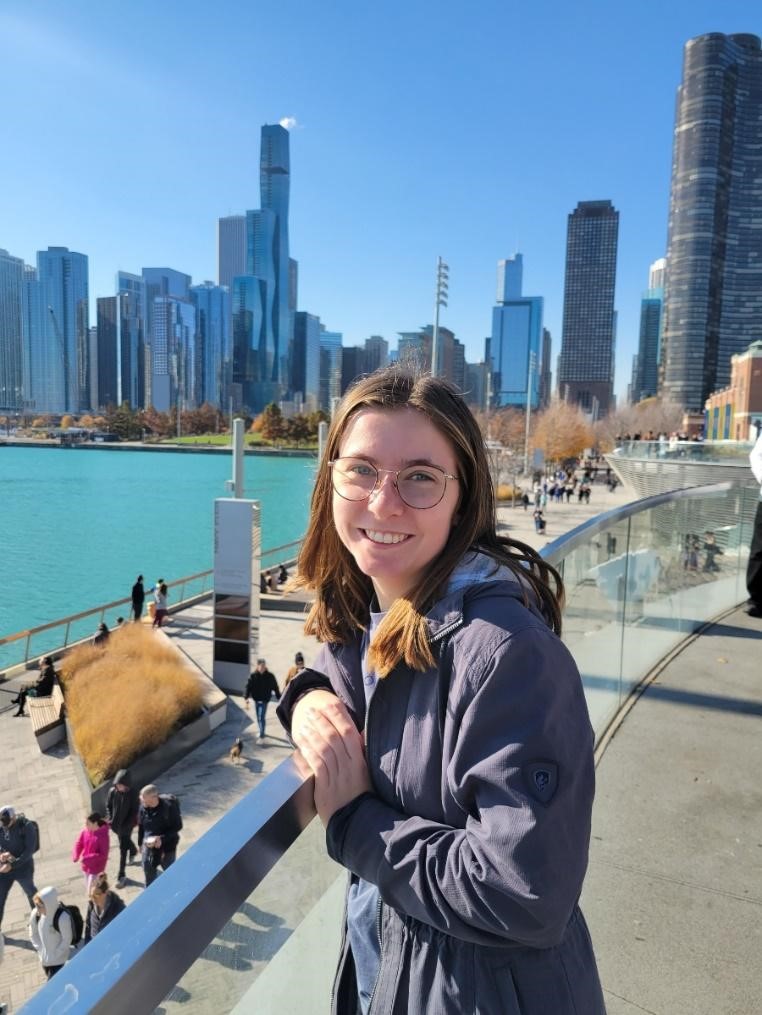Wondering what a double major with English looks like? Unsure of which majors can be paired with English? Seniors Carole Chee, Will Vance, and Piper Daleiden give us a glimpse into their experiences as double majors and offer insight into how an English major can complement other areas of study.
Carole Chee (’24): English and Women’s & Gender Studies
My name is Carole Chee, my pronouns are she/her/hers, and I am a double major in English Literature and Women’s & Gender Studies (WGS). The incredible opportunity to study under both these departments arose, in large part, from areas of privilege that I am extremely grateful for and keenly aware of.
The ability to carry over AP and dual enrollment credit from high school, paired with the flexibility of a liberal arts education, created room in my four-year plan for me to focus on the courses that I was interested in. It was a mix of this freedom, my breadth of interests, and indecision that led to my double major, and I am forever thankful!
As a Third Culture Kid (TCK) who grew up in Malaysia, a country rich in cultural and religious diversity, I’ve been constantly surrounded by and in pursuit of new perspectives that can widen my worldview. The power of stories to uplift those perspectives—especially marginalized and otherwise silenced voices—has been a main focus in both my English and WGS courses. From analyzing the gendered aspects of characterization in literary works to discussing the necessity of intersectional and ground-up liberation in publishing industries, each semester has further shown me how inherently connected my majors truly are. I once read “The Yellow Wallpaper” by Charlotte Perkins Gilman twice within the span of a few weeks—for an English course and then my WGS keystone.
Pursuing a double major is not for the faint of heart (and, as I noted earlier, can be quite inaccessible) but is incredibly worth it. I’ve honed invaluable skills in managing diverse curricula, forging interdisciplinary connections, and embracing multiple perspectives. These experiences have equipped me with the ability to juggle schedules effectively, prioritize empathy, and foster intersectional communities—a toolkit I eagerly anticipate applying in my post-Hope life.
Upon graduation, I plan to utilize my double major experience in the field of librarianship! I’m especially interested in creating access to resources and exploring how structures of power impact the way we categorize knowledge. The privilege to leverage my diversified education in creating empowerment is certainly not one I take lightly, and I know I’m well-equipped to do so because of my double major.
Will Vance (’24): English and Physics
Hello all! I’m Will Vance, a senior English literature and physics double major from Westfield, Indiana. Double majoring has been an interesting experience for me, in part because I wasn’t planning on majoring in English when I entered college. I had weighed what my interests were and picked what was likely to pay the best, but English ended up coming back around. I took several English classes for General Education requirements and decided to add English as a minor somewhere around the start of Junior year.
So, funnily enough, I’ve only formally been a double major for a little over a year. I think, ultimately, I couldn’t stay away from English because it gets closer to what I really love.
My favorite genre has always been fantasy; I’ve always been drawn to magic. And, as the saying goes, “sufficiently advanced science is indistinguishable from magic.” The draw to physics, in my mind, is that many areas of it feel like magic. My chief area of interest is astrophysics—how can exploring the stars not spark a sense of wonder, a sense of magic? The limitation being, of course, that doing so involves crunching numbers rather than reading fantastical stories.
Once I was back in the world of English, I found myself extra aware of frequent failings in the physics realm. Primarily, I became quite aware of difficulties in communication. Expert-to-expert communication within physics is handled just fine since both parties are privy to jargon and the science involved. When it comes to making research posters, however, I’ve definitely become aware of how language is not universal. Ideas within the research group that have acquired a one-word shorthand are actually concepts which even your average physics student would not be aware of. Communicating the story of one’s research in a way that is both coherent and technically detailed is a far more challenging task than I think many in the sciences give it credit for.
Outside this personal experience of overlap, I think the funnier experience from being a science and English double major is that no one expects it. Just about every time I’ve told someone my majors, I get the same, surprised, “Huh. What are you going to do with that?” There are, of course, the practical answers—I could be a technical writer, or any number of positions that primarily uses one of those degrees. There is an obvious need to correct the idea that English is relegated just to the classroom and publishing houses, but I think the other underlying implication is that physics and English are radically different. And while in form and content, yes, they certainly are, to me the central appeals aren’t so different. Dive deep enough into either subject, and they’re asking the same question—why? There is a reason that the moon, sun, and stars feature so heavily in poetry as well as physics. Look at them the right way, and I think it is hard not to feel the wonder of being alive.
Piper Daleiden (’24): English and Psychology
Hi! My name is Piper Daleiden, and I’m a senior double major in English literature and psychology from Milan, Michigan. I also have the privilege to be the Student Managing Editor for the English Department’s blog. When I started college, I didn’t quite know what to study. While I loved my English classes in high school, I thought that I needed to choose a future career and then determine my major from there. As I took some classes during freshman year to fulfill the General Education requirements, I started to see that my favorite courses were the ones that involved reading and writing.
I also found psychology to be fascinating and very relevant to working with others in daily life. My mindset shifted, and I recognized that I could pick majors that would make me most excited about learning. I ultimately decided to declare English and psychology as my majors, trusting that my academic interests would open opportunities to a variety of future careers when the time came.
When I declared my majors, I didn’t consider how they might interact. In fact, I expected them to remain very distinct from each other. I would learn about people and relationships, take exams, and do research in psychology, and I would read about fictional and historical events and write essays in my English courses. I’m happy to say that this separation has not been the case. My psychology courses are heavily rooted in reading and writing, and while psychology papers are certainly different than papers for English classes, I’ve been able to apply the analytical and organizational writing skills that I’ve gained from my English major. For example, when I was doing psychology research, the other students in my lab often asked me to proofread and revise parts of our paper and poster because they knew that my English major had prepared me with these skills.
English classes haven’t just supported me for my psychology major; psychology has also made its way into my work for my English major. When I tell people my majors, they often respond with a joke about how I’ll be able to psychoanalyze characters, and while this wasn’t my intention when declaring my majors, I’ve certainly seen this play out. During one semester, I was simultaneously taking Social Psychology and British Literature. In lecture, my psychology professor taught us about benevolent sexism. A few days later, as I was reading a piece for my English class, I realized that the characters in the piece were demonstrating benevolent sexism, and I incorporated my new psychology knowledge into a writing assignment for this English class. Small moments like these remind me that studying English has allowed me to develop a variety of skills, from analyzing writing to drawing deep connections, which will enhance my learning and work in other subject areas and wherever I go after graduation.





